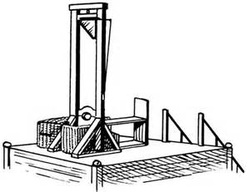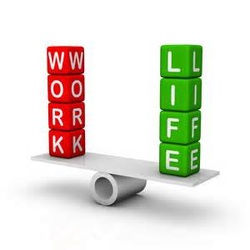
Every few years it comes back into vogue, the work and life balance discussion. How do you achieve it, and practice it, on a consistent basis. While we at SSWM do focus on the psychology of business, we felt that the renewed interest in this topic was particularly relevant in the context of navigating through the worst recession in United States history. This ‘new normal’ has no guidebook.
It has been an employers market for the past five or six years, maybe longer. Wages are flat and stagnant, raises are non-existent, and performance evaluations put on hold indefinitely. More productivity out of less headcount, burn and churn, ‘if you won’t do it, we’ll get someone half your age and at half the pay who will.’ Fear of being laid off, losing your health care, life insurance, future retirement income and inability to finance your children’s education. How can you balance your life when your life depends on work; fear and survival makes work a priority.
It has been an employers market for the past five or six years, maybe longer. Wages are flat and stagnant, raises are non-existent, and performance evaluations put on hold indefinitely. More productivity out of less headcount, burn and churn, ‘if you won’t do it, we’ll get someone half your age and at half the pay who will.’ Fear of being laid off, losing your health care, life insurance, future retirement income and inability to finance your children’s education. How can you balance your life when your life depends on work; fear and survival makes work a priority.

(click)
Definitions please:
Life: the sequence of physical and mental experiences that make up the existence of an individual.
Work: a job or activity that you do regularly especially in order to earn money.
Balance: a state in which different things occur in equal or proper amounts or have an equal or proper amount of importance.
Life: the sequence of physical and mental experiences that make up the existence of an individual.
Work: a job or activity that you do regularly especially in order to earn money.
Balance: a state in which different things occur in equal or proper amounts or have an equal or proper amount of importance.

In a recent survey by Psychology Today, workers felt:
- Overwhelmed and depressed – competing demands are unmanageable
- Workload is too much for one person to handle
- Constant demand to work smarter, harder & faster
- Anxiety over downsizing and/or wage reduction
- Hourly expectations - length of work day unrealistic
- Exercise - no time to focus on health
- Nutrition - inability to control nutritional requirements
- Prescription Drugs too plentiful - taken to numb or speed up
- Alcohol & Illegal Drugs - necessity to ease social tension and to self-medicate

Doctors advice, which also includes just writing a prescription, is summarized:
- Build downtime into your schedule. When you plan your week, make it a point to schedule time with your family and friends, and activities that help you recharge.
- Drop activities that sap your time or energy. Take stock of activities that don't enhance your career or personal life, and minimize the time you spend on them.
- Rethink your errands. Consider whether you can outsource any of your time-consuming household chores or errands.
- Get moving. It's hard to make time for exercise when you have a jam-packed schedule, but it may ultimately help you get more done by boosting your energy level and ability to concentrate.
- Remember that a little relaxation goes a long way. Even during a hectic day, you can take 10 or 15 minutes to do something that will recharge your batteries.

Similar, a Fortune 500 CEO recently provided these words of wisdom in a Forbes article:
- Schedule down time.
- Cut out the things that don't add value to your life.
- Avoid negative people that suck the energy out of you.
- Outsource those tasks that you can.
- Take five for you.
Both from the Doctor, and CEO, which has irony of its own as both professions have a reputation for 'workaholic' behavior. I find them to be bumper sticker suggestions of superficial solutions, contradictions and oversimplifications. Chances are these individuals have no work/life balance either. Who says there has to be a work life balance anyway? Who is the beneficiary, and loser, of this balance? Are there alternatives?
"Work Life balance is just another individualistic, achievement-oriented model based in modern bureaucratic organization thought setting us up to strive for one more thing that we can not achieve and, in doing so, keeping us too focused, busy, and tired to explore the consequences of our thinking and actions." -Caproni

Can we execute on a strategic, goal oriented approach to life? I don't think that we have that much control and choice in our lives. Life is quite dynamic. Many of our best laid plans are already out of date before we can put our strategy into action. Life is difficult to plan. There is no crystal ball, there are plenty of dominoes. I do not believe that a calculated balance is possible. What is the formula, where do I find the equation?
In the span of one year, I have lost 3 acquaintances who, sadly, fit interesting profiles.
Suggestions - if one were to look for balance:
In the span of one year, I have lost 3 acquaintances who, sadly, fit interesting profiles.
- Jim - sought a balance. High paid executive with a global financial services firm (with the lion). Burned out, dropped out, simplified his life, got back to nature. Was killed in a high country ATV rollover this month.
- Steve - found a balance. Substantial financial payout allowed him to realize his dream of more time with his family. Ambushed by cancer, died in August.
- Mark - always had balance. Successful law practice that allowed him to set his own hours. Gorgeous wife, huge home, multiple cars, exotic vacations, children in private schools. Died of a heart attack while running in January.
Suggestions - if one were to look for balance:
- Work must be productive, it is hard (thus the name), but do try to make it fun (inject humor where you can).
- Unpredictability and lack of control are inevitable in life learn to accept it.
- Life, leave some slack, measure it by how you feel rather than the goals you accomplish.
- Identify your values and change your life accordingly – regardless of fiduciary ramifications if necessary.
- Work less hours, keep nights and weekends for nonworking activities.
- Make significant and high-quality contributions during working hours. Provides some peace of mind.
- Eliminate work that does not make those significant contributions to the firm.
- Gut check - Do you value Net Worth over Self Worth? Do you measure success by the size of your wallet?
- Explore the luxury of ‘fuck you’ money. $4 to $5 million in the bank is a nice anxiety cushion, is that an option?
- Get paid extremely well for what you do. Money doesn't buy happiness, but it sure does take the sting off at the dinner table.
- Work / Life balance as a goal may lead you down the same path your trying to get off. We run the risk of over-planning our lives. Balance your balance in moderation.
- Do not set yourself up to fail by attempting to achieve the unachievable.
- Do not let the ‘idealized image’ be pushed on you if you do not choose to, or can not, accept it.
- In the end, balance is not the goal, living life is. You should be able to live the life you choose, and choose the life you live.

Not intended to inject religion, and we at SSWM view it more as Science of the Mind, the Buddha nailed it, but I don't think he had to deal with the Cell Phone budget, back to school supplies, never ending car repairs, laundry, the broken toilet and anxiety over losing his job.
This Life balance is exemplified in the Eightfold Path: Right Understanding, Right Thought, Right Speech, Right Action, Right Livelihood, Right Effort, Right Mindfulness and Right Concentration. Traditionally the Noble Eightfold Path is divided into three parts – Virtue, Concentration and Wisdom. Another useful way to divide it is as intellectual training, ethical training and psychological training. No disrespect to Siddhārtha Gautama, that's a lot of work and not sure where Right Paycheck fits in. Bottom line, you need to get it straight in your own head. Remember, Sua Sponte.
This Life balance is exemplified in the Eightfold Path: Right Understanding, Right Thought, Right Speech, Right Action, Right Livelihood, Right Effort, Right Mindfulness and Right Concentration. Traditionally the Noble Eightfold Path is divided into three parts – Virtue, Concentration and Wisdom. Another useful way to divide it is as intellectual training, ethical training and psychological training. No disrespect to Siddhārtha Gautama, that's a lot of work and not sure where Right Paycheck fits in. Bottom line, you need to get it straight in your own head. Remember, Sua Sponte.

The more important your family becomes, the more important financial dependencies are and thus work. Values do not fall into clean dichotomies that lend themselves to prioritization and trade-offs. How is your work life balance? Whose life is it anyway? Sua Sponte.
Bradford C. Bruner for Sua Sponte Wealth Management
Bradford C. Bruner for Sua Sponte Wealth Management

















































